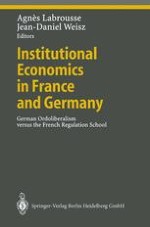2001 | OriginalPaper | Buchkapitel
German Contemporary Analyses of Economic Order: Standard Ordnungstheorie, Ordoliberalism and Ordnungsökonomik in Perspective
verfasst von : Sylvain Broyer
Erschienen in: Institutional Economics in France and Germany
Verlag: Springer Berlin Heidelberg
Enthalten in: Professional Book Archive
Aktivieren Sie unsere intelligente Suche, um passende Fachinhalte oder Patente zu finden.
Wählen Sie Textabschnitte aus um mit Künstlicher Intelligenz passenden Patente zu finden. powered by
Markieren Sie Textabschnitte, um KI-gestützt weitere passende Inhalte zu finden. powered by
Characterizing the processual orderliness of economic structures is a strong tradition of German economic discourse (Tribe 1995 pp. 1–8). The oldest contributions came from the cameralist sciences which, by defining the role of the state established a link between welfare objectives, the social as well as the legal order, and consensus. Friedrich List, for his part, defines a national and historical system of the economy that is opposed to the “cosmopolitan” view of British paleo-liberalism. For List, the structure of an economy can only be understood with reference to the political interests of nations which themselves depend on the stage of economic development reached. Subsequently, the German Historical schools developed appropriate tools for analysing economic structures and evolution. By introducing a revised method of analysis that leads to the definition of the concept of economic order, the Freiburg school finally emerged as the contemporary synthesis of the ideas relating to this issue.
